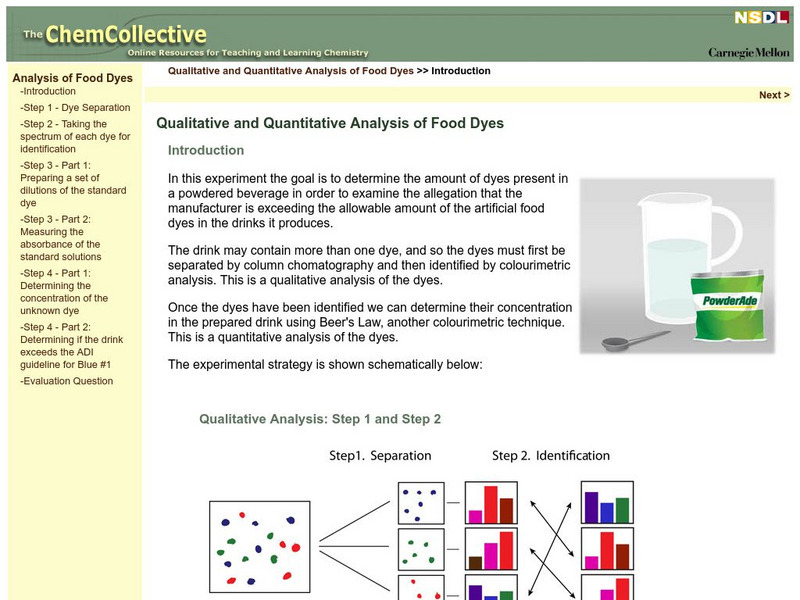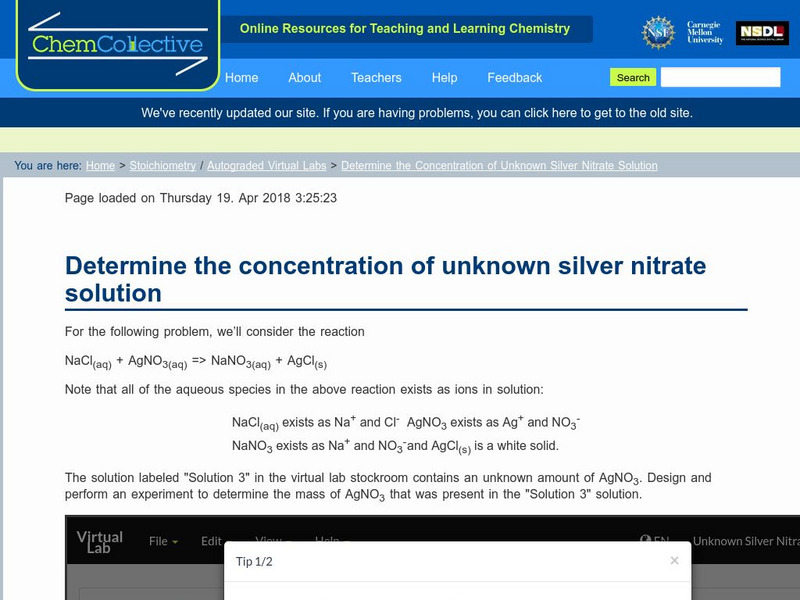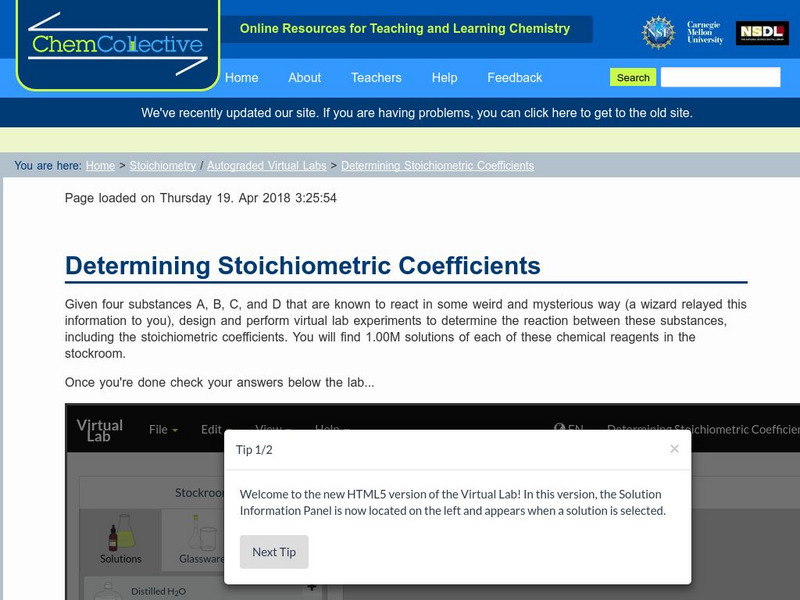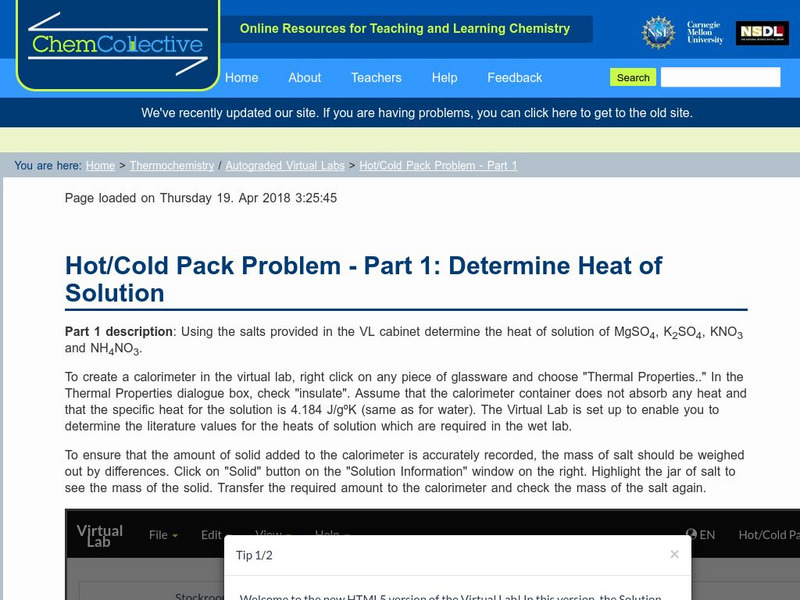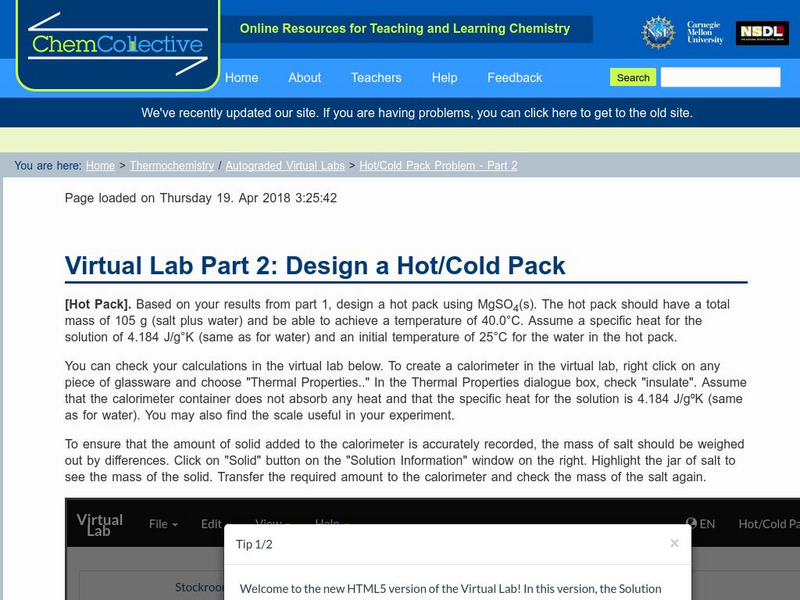Chemistry Collective
Chem Collective: Mission Critical Chemistry
Students use stoichiometry and thermochemistry to design a new fuel for a mission to Mars. In this activity, students work in teams using the virtual lab to characterize a new set of oxidants and reductants that can serve as a fuel for...
Chemistry Collective
Chem Collective: Camping Problem
Measure the enthalpy of a reaction and then create a solution warm enough to cook food.
Carnegie Mellon University
Chem Collective: Acid Mine Drainage
Students explore the chemistry behind the causes and effects of acid mine drainage on a modeled river. In this activity, students examine the chemistry of acidic mine runoff and its effects on river water.
Carnegie Mellon University
Chem Collective: Arsenic in Drinking Water
Set in the context of ground water contamination in Bangladesh, this stoichiometry and analytical chemistry activity examines the issues around identifying wells contaminated with arsenic.
Carnegie Mellon University
Chem Collective: Osmotic Pressure
When a balloon is filled to near bursting with SF6 is left in air, it will often burst after a period of time. This is because the smaller N2 molecules diffuses into the balloon while the larger SF6 molecules remains causing the balloon...
Carnegie Mellon University
Chem Collective: Brownian Motion
Particulate level simulations that show only solute particles are convenient, since they focus student attention on the molecules of most interest. However, such solute molecules move in a Brownian manner. This simulation helps students...
Carnegie Mellon University
Chem Collective: Chemical Potential: Staircase Demonstration
As we look for connection points across disciplines, we are increasingly drawn to chemical potential as the connection point. This simulation shows particles thermally distributed on a staircase. A linear increase in energy leads to an...
Carnegie Mellon University
Chem Collective: Mineral Composition
In this randomized calculation activity, students calculate the empirical formula of a compound given its elemental analysis. Step-by-step support and feedback is provided for students who need additional help.
Carnegie Mellon University
Chem Collective: Composition Determination of a Mixture
In this activity, students calculate the percent composition of a mixture of two arsenic-containing minerals. Step-by-step support and feedback is provided for students who need additional help.
Carnegie Mellon University
Chem Collective: Dna Binding Dyes Scenario
This activity explores the equilibrium of dyes that self-assemble into DNA templates. Students use knowledge of equilibrium and quantitative spectroscopy to explore different dyes that bind selectively to DNA molecules. In this activity,...
Carnegie Mellon University
Chem Collective: Meals Ready to Eat
While camping on the Appalachian Trail, a storm dampens all the fire wood and you must design a chemical reaction to heat your meal. In this activity, students design an experiment in the virtual lab to determine the heat of reaction for...
Carnegie Mellon University
Chem Collective: Ozone: A Scenario Based Activity in Kinetics
Students use kinetics to interpret raw experimental data to determine the mechanism of ozone destruction. In this pen and pencil activity, students are given data obtained from laboratory experiments to study the ozone depletion reaction.
Carnegie Mellon University
Chem Collective: Qualitative and Quantitative Analysis of Food Dyes
An interactive tutorial to determine the amount of dyes present in a powdered beverage in order to examine the allegation that the manufacturer is exceeding the allowable amount of the artificial food dyes in the drinks it produces.he...
Carnegie Mellon University
Chem Collective: Stoichiometry Bridge Course
This is a complete course in chemical stoichiometry, set in a scenario that shows how stoichiometry calculations are used in real-world situations. This course has been designed to not only help you strengthen your skills with...
Chemistry Collective
Chem Collective: Creating a Stock Solution
In this activity, students use the virtual lab to create dilute solutions from a concentrated stock solution of acids or bases. They must first calculate the correct volumes of concentrated acid solution and water to mix together to...
Chemistry Collective
Chem Collective: Metals Density Problem
In this activity, students use the virtual lab to identify three unknown metals by measuring their density and comparing their measurements to the densities of known metals. In this randomized version, each student designs and performs...
Chemistry Collective
Chem Collective: Determining Reactants and Products in a Solution of Dna
In this limiting reagents problem, students are given specific concentrations of DNA solutions and are asked to predict what products and reactants will remain after a specific volumes are mixed and reaction has occurred.
Chemistry Collective
Chem Collective: Determine the Concentration of Unknown Silver Nitrate Solution
In this limiting reagents problem, students are asked to determine the amount of silver nitrate dissolved in a solution by performing a reaction with solid NaCl. In this randomized activity, each student is given a different unknown...
Chemistry Collective
Chem Collective: Chemical Remediation of Arsenic
In this problem, students determine the limiting reagent in a reaction involving the remediation of arsenic from drinking water.
Chemistry Collective
Chem Collective: Determining Stoichiometric Coefficients
Students use the virtual lab to determine how four unknown substances react with each other including their stoichiometric coefficients. In this randomized activity, each student receives a different reaction and students can check their...
Chemistry Collective
Chem Collective: Coffee Problem
In this activity, students use knowledge of specific heat capacity to mix together hot coffee and cold milk to create a solution of coffee at a desired temperature. In this randomized problem, each student is given a different final...
Chemistry Collective
Chem Collective: Hot/cold Pack Problem: Part 1
Determine the heat of solution for various salts.
Chemistry Collective
Chem Collective: Hot/cold Pack Problem: Part 2
Based on information from Part 1 of the Hot/Cold Pack Problem, design a hot/cold pack.
Chemistry Collective
Chem Collective: Unknown Weak Acid Problem
Perform an experiment to determine the pKa and concentration of an unknown acid.














